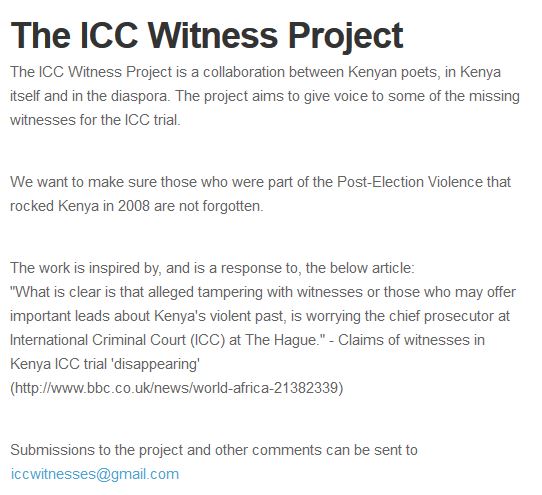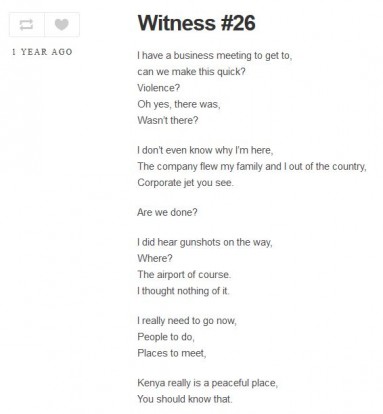What is the ICC Witness Project "About"?
If you give the “About” page no more than a cursory reading, the ICC Witness Project is essentially a project to remember. As such, there is nothing very controversial or dangerous about it. Who, after all, could dispute the necessity to remember? Memory is passive, a noun not a verb, and the verb “to remember” is barely a verb at all. Even presidents who exhort us to “look forward, not back” when it comes to substantive matters (like prosecutions) can also easily pay lip service to the importance of memory and history; it easy to convert the imperative to remember the past into the act of moving forward into the future. We must move on.
In part, this is because we tend to construe “memory” as a relatively passive act, because we are simply recalling to mind things that we already remember, which are already there. The act of remembering them, then, is simply recognizing the trace of past experience as it has already been inscribed in the present, reading the pages of a book that has already been written. If the memory is there, it’s there because we already remember it; if it isn’t, then, by definition, we can’t remember it. In this way of thinking about it, then, “remembering” has no real consequences, because doing so changes nothing: either you remember or you don’t.
This way of thinking about memory, however, is very flawed, has it completely backwards. As neuroscientists tell us, memory is anything but passive: we construct and reconstruct what we think we know about the past on a daily basis, especially while we are apparently doing nothing, sleeping. Memory is active; it's forgetting that's passive. You have memories because you remember them, not the other way around.
In this sense, our long term memories are better understood as memories of memory, the act of remembering the copy which we have made of a copy of a copy of a copy of our original—but now long-lost—short-term impressions and experience. Memory, in this sense, is not the nightmare from which we are trying to awake; it’s the reality to which we awake, at the end of the cognitive process which makes our short-term into long-term memory, by processing and digesting a messy aggregation of thoughts and sense-data into a much more simplified and streamlined narrative of what happened. This is where narrative comes in, the net that catches memories and prevents them from falling away. We forget the vast majority of what we once knew, and there’s no way to avoid that, nor would we want to; right now, you can all remember what you ate for breakfast this morning, but unless there’s some reason to remember it, that memory will be neglected, will fade, and eventually will simply drop out of your mind, forgotten and irrelevant. Which is to say, unless it becomes part of a story—“I was eating oatmeal when I saw the flying saucer”—it won’t even become a memory. It will just be data that was left out, forgotten, noise that never became a sound.
This is why eyewitness testimony is so unreliable. Even when witnesses think they are telling the whole truth and nothing but the truth, they are in no position to know for certain. At most, they are telling the story that they have told themselves about what happened, and they can have no direct access to the original event. After all, we have forgotten all the things that we have forgotten, including the fact that we forgot it, so memory is not a process that we can have direct knowledge of or control over: it is literally the limit-point of our conscious minds, by definition, what divides consciousness from unconsciousness, intention from immanence.
In practice, then, we have no choice but to trust the narratives which we have produced of our past; they’re all we have, and we use them because we have to. Knowing their limitations doesn’t change that fact; all we know is what we know, even if we know we don’t really know it. This is why ideology is a good word for acting as if we know and believe something we know we don't know or believe; we lack an alternative. There's no other candidate to vote for.
The more we engage with this limitation, however, the more thoroughly we must revise our understanding of memory’s passivity, and therefore, of its consequences: to remember is to create new stories, a process which, in turn, makes it possible to create new memories. If forgetting is the default, the baseline, then the exceptional case is our active work of remembering, the manner in which we convert “what happened” into a narrative memory. Forgetting, then, is not an act of erasure; it is the passivity of not remembering, an inaction connected to a lack of desire. By contrast, a desire to remember produces the act of narrativizing, and that production of a narrative makes the past becomes present.
The ICC Witness Project is animated by a desire to remember, and it does so actively and with a clear purpose: to tell a story of Kenya in which all Kenyans are human.
Here, I turn to Judith Butler's observation that obituaries are about building the nation, or to use Benedict Anderson's term of art, "imagined communities": we imagine the life that is not life by failing to grieve it, and we imagine community by telling the story of our regret for a life that is no longer alive:
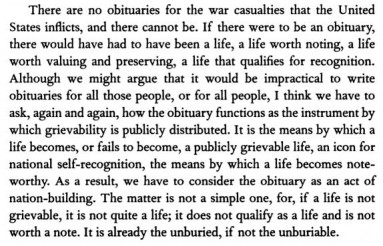 If we do not make memory through our grief, then life is not grievable; if we forget that someone was alive, then they never were.
If we do not make memory through our grief, then life is not grievable; if we forget that someone was alive, then they never were.
While the ICC Witness Project begins from a presumption of active repression--the notion that witnesses are being intimidated and bullied into silence and complicity, something most observers pretty much accept--I want to suggest that what is being cultivated, here, is not memory, per se, but the desire to remember. After all, the ICC Witness Project is not, itself, connected to or part of the actual ICC trial, nor are the "witnesses" who speak in each poem "witnesses" in a literal sense. And yet--and here might be an apparent contradiction--one of the things the poems most tenaciously "witness" is the desire to do something other than remember the dead. To have peace and stability for business, for example:
Or to move on, to live in the futurity of development, and to construe "need" by reference to the desire that victims not exist:
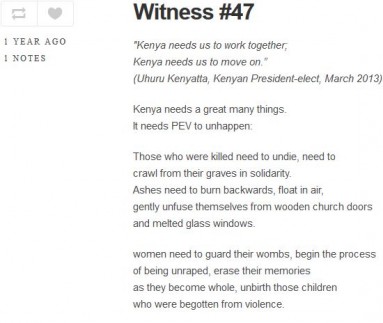
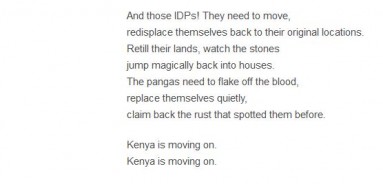
Previous:
- Reading the ICC Witness Project: Witness #135
- Reading the ICC Witness Project: Witness #69
- Reading the ICC Witness Project: (un)Witness #20, #22, #34
- Reading the ICC Witness Project: Witness #140
- Reading the ICC Witness Project: Witness #124
- (Some Provisional Writing on) “Time, Poetry, and the ICC Witness Project”
